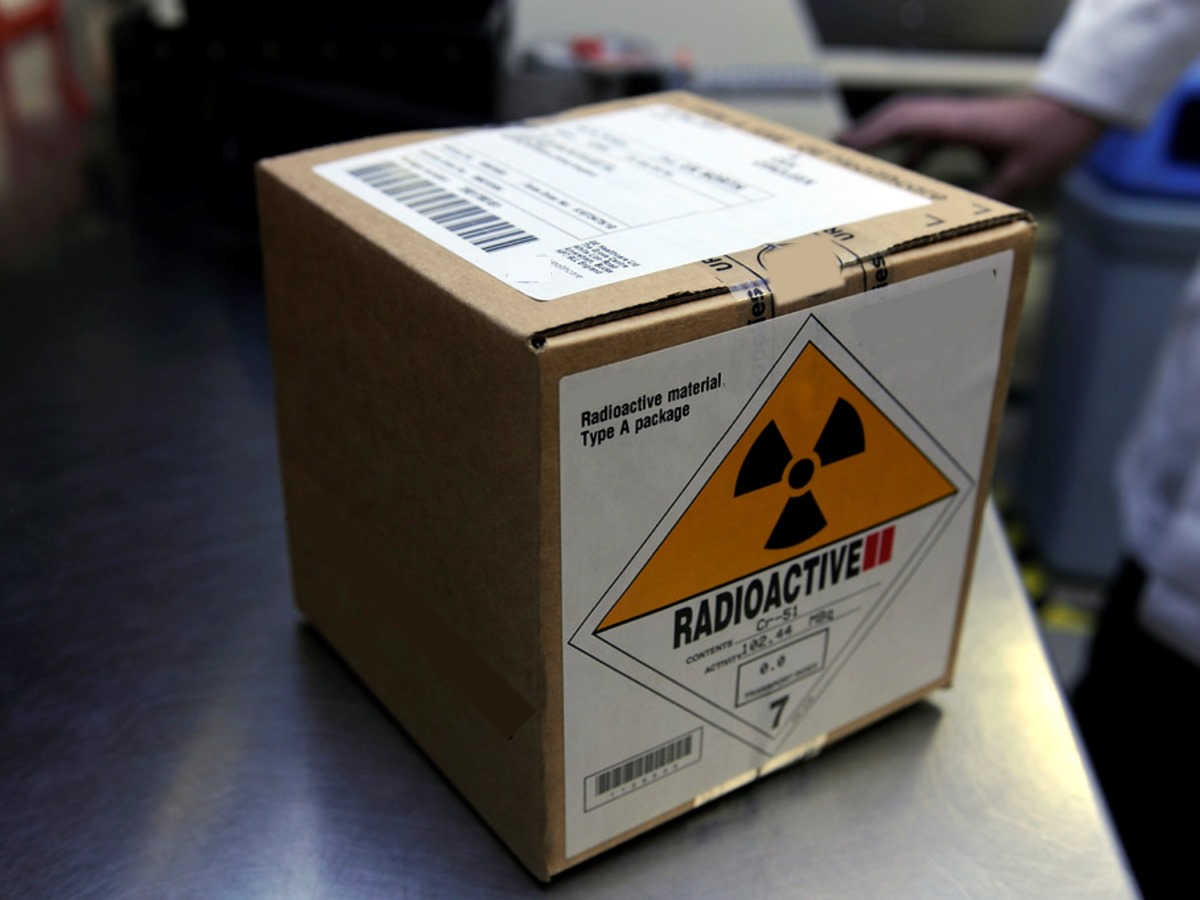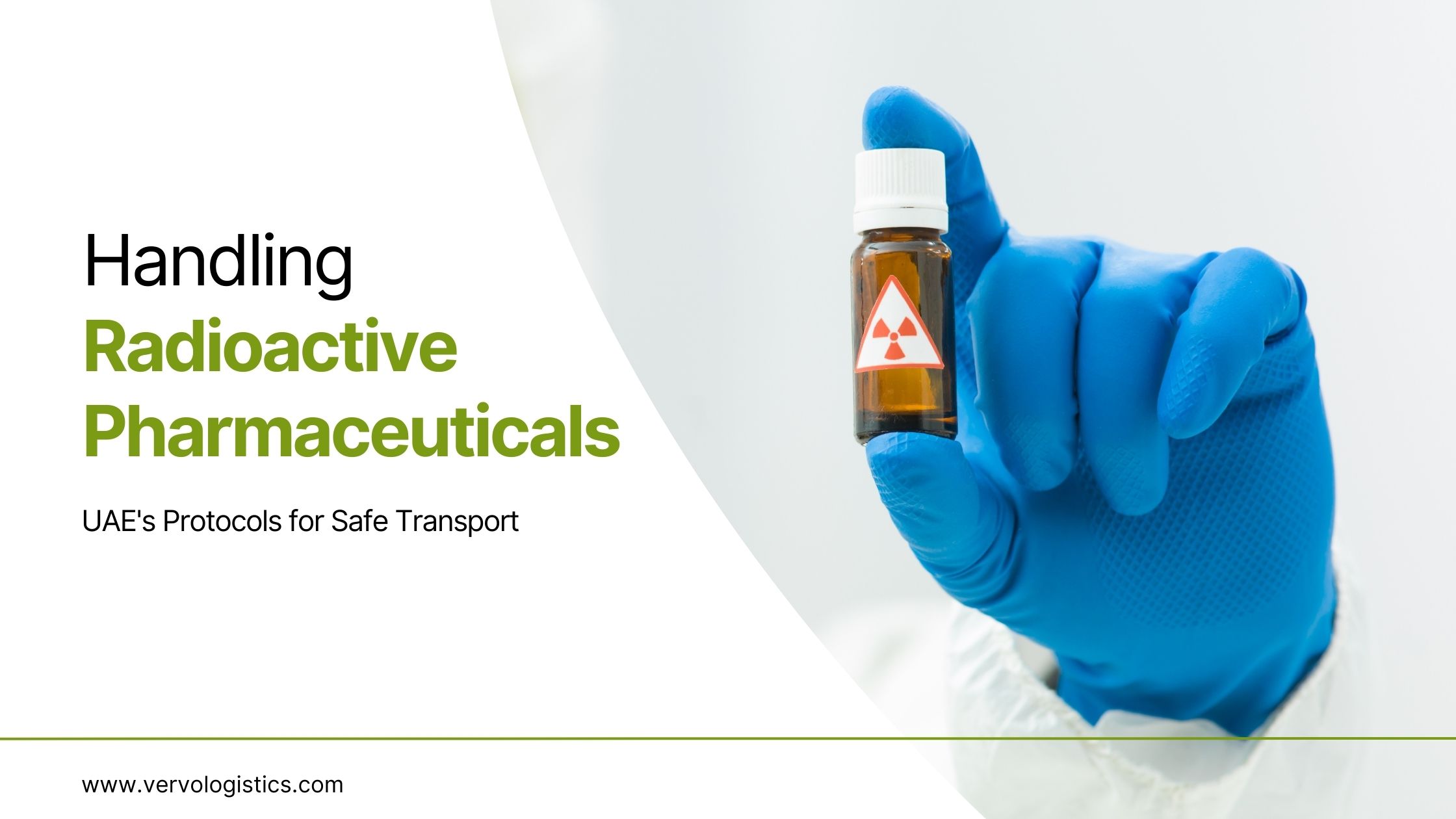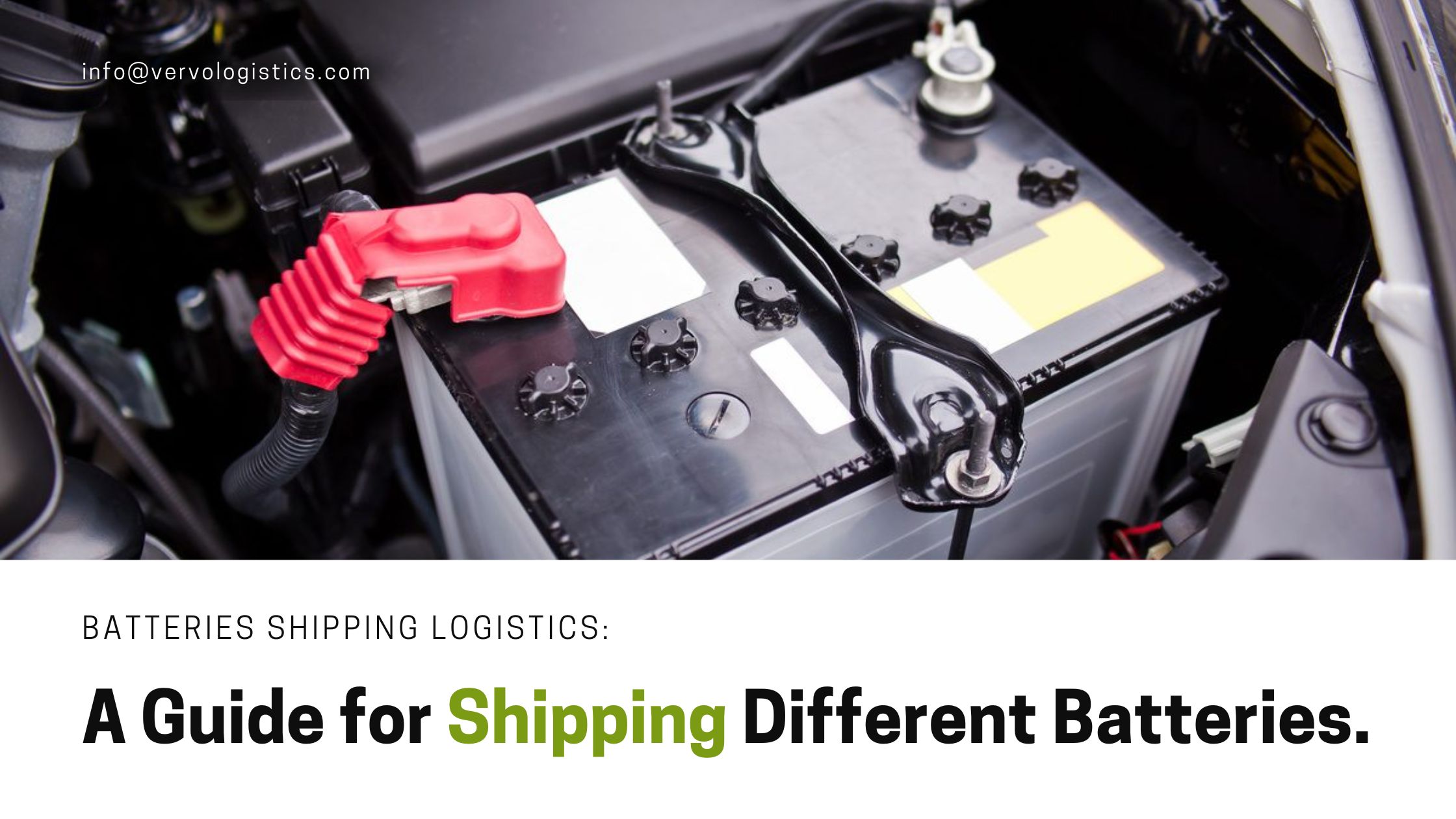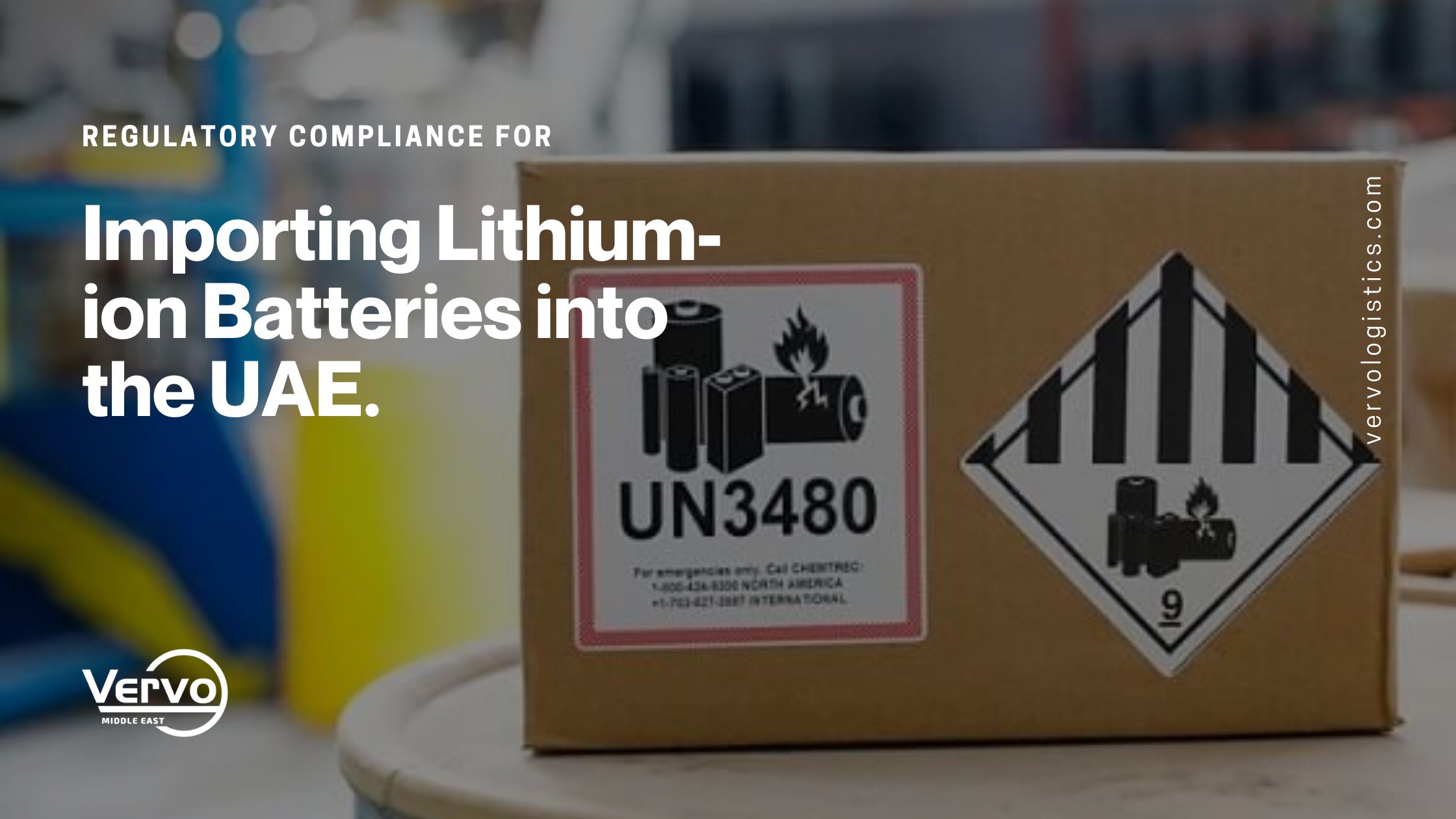Radioactive pharmaceutical medications contain radioactive isotopes that allow clinicians to diagnose and treat a wide range of conditions, from cancer to thyroid disorders. They are particularly useful in oncology, cardiology, and neurology.
However, unlike usual pharmaceutical cargo, radiopharmaceuticals can pose risks, e.g., radiation exposure and contamination, if improperly shielded or handled. Their transport requires stringent safety protocols to protect them from radiation exposure.
The UAE enforces a stringent regulatory matrix to govern the transport of radioactive materials. In this article, Vervo Middle East’s team provides an overview of the UAE's strict regulations and best practices for transporting and handling radioactive pharmaceuticals.
How Does the Emirati Law Organize the Transport of Radiopharmaceuticals?
The Federal Authority for Nuclear Regulation (FANR), established by the UAE’s Decree No. 6 of 2009 for the peaceful use of nuclear energy, is responsible for overseeing safety in the transport of radioactive materials, including radiopharmaceuticals. FANR's mandate extends to licensing, inspection, and enforcement, ensuring that all entities involved in the radioactive supply chain comply with the law.
Companies transporting radioactive pharmaceuticals must apply for a license from FANR aligning with standards set by the International Atomic Energy Agency (IAEA), the Arab Atomic Energy Agency (AAEA), and the Arab Network of Nuclear Regulators (ANNuR).
Transport companies for radioactive pharmaceuticals are required to always maintain comprehensive records with details of the radioactive consignments, risk assessments, safety measures, and transportation events. Licensed carriers must submit detailed transport plans to FANR in advance, detailing the shipment's proposed route, schedule, and security measures. Every transport plan must include a risk assessment that considers factors like traffic density, road conditions, proximity to populated areas, and potential environmental impacts.
Drivers must always carry documentation and report any deviations, accidents, or emergencies to FANR immediately. These documents are also essential for traceability throughout the logistics chain. Shipments pass through customs at approved UAE border crossings with strict screening procedures. There should be pre-coordination between customs officials and FANR to clear and monitor any incoming radiopharmaceutical imports.
Licensing and Compliance for Radiopharmaceutical Transportation
To transport radioactive materials in the UAE, companies must obtain a “Nuclear Material License” and a “Radioactive Material Transport License” from the Federal Authority for Nuclear Regulation (FANR). The license application involves a safety review, along with proof of adequate facilities, equipment, trained personnel, and emergency plans.
Compliance is enforceable and monitored through regular inspections and audits conducted by FANR. Licensed carriers are subject to FANR's “Regulations for the Safe Transport of Radioactive Materials,” which encompass international standards set forth by the IAEA's Transport Regulations (SSR-6). It comes with strict requirements for packaging, vehicle conditions, documentation, and incident reporting. FANR conducts regular inspections and enforces compliance through fines or license suspensions.
All personnel involved in radioactive material transport must hold a valid “Radiological Protection Certificate,” which is obtainable through FANR-approved training courses per IAEA standards. This includes Hazardous Materials (HAZMAT) certification for drivers from the Environment, Health, and Safety Center at the Federal Transport Authority.
The Radiation Protection Officer (RPO), holding a radiation protection officer certification from FANR, oversees compliance and liaises with regulators. The authorized consignor must have at least one qualified expert certified by FANR as a radiation protection expert (RPE). The RPE is responsible for properly classifying, documenting, marking, labeling, and packaging radioactive shipments.
Personnel are also required to complete a “Radiation Protection and Safety of Radiation Sources” training program and the IAEA's Radioactive Material Packaging and Transport training. Companies must keep full records of all individual licenses, certifications, and training.
Packaging of Radiopharmaceuticals

Radiopharmaceuticals require certified fail-safe packaging to contain radiation and prevent leaks or exposure.
The UAE mandates the use of Type A packages for radiopharmaceutical cargoes that do not exceed the activity limits. These packages withstand shocks, punctures, resistance to impact, pressure, and fire for a defined duration that could occur during normal transportation.
The higher-activity radiopharmaceutical cargoes must be transported in Type B (U) packages. These packages provide enhanced protection, even in major accidents, featuring thick lead shielding surrounded by stainless steel drums with security seals. They have greater impact resistance, fire resistance for a longer period, and withstand submersion under water. Type C packages are used for the transport of extremely hazardous radiopharmaceuticals, typically by air, and are designed to withstand more severe accidents.
Advanced materials, such as high-density polyethylene and tungsten, are often employed in packaging for their radiation-absorbing properties that contain the contents even under duress.
Labeling of Radiopharmaceuticals
The labeling standards are in line with those defined by the IAEA's SSR-6 regulations. All packages must display radiation warning labels like the yellow/magenta trefoil symbol. Labels list:
- The radioactive contents and estimated activity level.
- Transport index, which indicates the degree of radiation emitted by the package.
- The United Nations (UN) number for identifying radioactive substances ( its isotope and the proper shipping name).
- The shipper's license number with "Cargo Aircraft Only" labels for air transport.
- Origin, destination, emergency contact numbers, and handling instructions.
Packages are marked with serial numbers to link to the shipment's documentation. Tamper-proof seals track the chain of custody from production to administration. Radioactive labels are also required during storage to warn of radiation exposure risks. These labels must be durable, easily visible, and firmly attached to the container.
Transportation of Radiopharmaceuticals
Approved modes include road, air, and sea.
For road transport, FANR mandates the use of dedicated vehicles with radiation-shielded containers. Drivers must take the most direct highway route while avoiding tunnels, residential areas, and other restrictions. Alternate routes are identified to be used in the event of unexpected events, like road closures or traffic conditions. Armed escorts provide additional security.
Air transport is restricted to cargo aircraft only. Airlines must be approved and equipped for radioactive cargo. The tarmac area is secured with limited access during loading and unloading. Shipments are flown point-to-point with no unauthorized stops. Cabin crews are provided with dosimeters to monitor radiation exposure. Air transport is closely coordinated with the “General Civil Aviation Authority (GCAA).”
Sea transport follows designated shipping lanes with strict port security. Proper stowage and separation from other dangerous goods are enforced under the “International Maritime Dangerous Goods (IMDG) Code.”
UAE law requires certified leak-proof containers and damage-resistant designs. They must retain integrity with features like double-walled stainless steel cylindrical structures cushioned inside shock-absorbing overpacks. They include lead shielding with locking mechanisms to prevent accidental opening. Vehicles must carry GPS trackers and radiation monitoring equipment with real-time transmission to FANR.
In case of a transportation accident, FANR works with the National Emergency Crisis and Disaster Management Authority (NCEMA), the Ministry of Interior, the Health Authority of Abu Dhabi (HAAD), and the Dubai Health Authority (DHA). First responders are trained to initiate emergency containment to detect and contain radioactive releases while minimizing exposure. Typical emergency response protocols involve prompt notification procedures, coordinated response actions, and post-incident evaluations. These protocols are regularly tested and updated under the oversight of FANR to handle any contingencies.
Handling and Storage Upon Arrival
Unloading areas are designated and controlled to avoid any unauthorized access.
Upon arrival, cargo is unloaded by trained personnel, packages and labels are checked for damage, and containers are inspected for tampering. All containers are surveyed with radiation detection equipment to detect any leaks and confirm that the external radiation levels are within the expected range. Contents are verified against transport documents before acceptance.
The UAE requires storage in restricted areas with strict access control and 24/7 security surveillance. Facilities must have certified ventilation systems, radiation shielding, and emergency power backups. Dosimeters monitor the cumulative exposure of workers.
Inventory logs track each radioactive source. Inventory management systems are employed to track the use-by dates of radiopharmaceuticals and assist in the disposal of expired materials.
Radiopharmaceuticals are stored according to their radioisotope and activity level, often in lead-lined safes or cabinets, to minimize the risk of cross-contamination. They are shelved by half-life, with the shortest-lived ones placed to facilitate ease of access.
Time is critical when handling radiopharmaceuticals. The receiving facility must coordinate with clinical schedules so patient doses are dispensed within the allowable window after production. Most radiopharmaceuticals cannot be stored for reuse due to rapid isotope decay. Prompt courier delivery to hospitals and clinics is scheduled accordingly.
Got any questions about the shipping and logistics services of radiopharmaceuticals in the UAE? Reach out to our logistics team:
☎️+971508723352
📧




